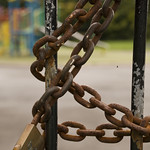 Hazardous Playgrounds: Can My Ex Take My Child There?
Hazardous Playgrounds: Can My Ex Take My Child There?
In any marriage, parents will have different ideas about properly raising children. These disputes regarding parenting styles continue after couples divorce. Some parents will be more permissive to the point of ignoring a hazardous environment, such as an old and battered playground. When one parent is irresponsible with the child’s safety, the other parent should be motivated to take action.
Criminal Penalties
Criminal sanctions for taking a child to a playground are usually not possible. Child endangerment statutes vary between jurisdictions, but generally, there has to be intent to place the child into a dangerous situation. California law requires criminal negligence, which is a much higher standard than ordinary negligence. Taking a child to a playground that has peeling paint or the occasional sharp edge would probably not meet this standard.
If the parent is taking the child along to meet with drug dealers at the local playground, discussing the situation with the local police may be prudent. In practice, getting the police to file charges and getting the prosecutor to pursue the case can be difficult.
Custody Dispute
Divorcing parents have a high probability of being involved in a dispute over joint custody. In most states, custody decisions are made by the courts. Judges can modify custody arrangements at their discretion in most jurisdictions. While a parent may not be criminally liable for bringing a child to a hazardous playground, a judge can set conditions on the parent’s custody.
Endangering the child by taking him or her to a hazardous location may not constitute criminal liability, but it can sway a judge. The court can either order the parent to not bring the child to that location or modify the parent’s right to custody. Parents often raise trivial issues during custody disputes, so the judge will want proof that the playground is actually dangerous. Showing evidence of blatant criminal activity, drug usage, and other serious safety problems can sway the judge.
Liability
In the event of an injury, our Charleston personal injury attorney adviser points out that a property owner who fails to maintain the property may be liable. If the property had hidden defects, such as rusted or sharp equipment, the property owner must either warn guests or repair the defect. Failing to do so constitutes a breach of the property owner’s duty of care, and may make the property owner liable for negligence. A playground is likely to be in a public park or school. Thus, the city would be liable for failing to maintain its facilities.
Filing a lawsuit against the spouse for the same cause of action is also possible. The guardian has a duty to care for the child, and taking the child to a hazardous location may constitute a breach of that duty. If the plaintiff can show that the playground was actually dangerous, then the parent may sue on behalf of the child as his or her legal guardian. Lawsuits are expensive. Additionally, lawsuits will cement an adversarial relationship between the parties, which can have detrimental effects on the way that the child views one or both parents. Thus, parents should view a lawsuit as a last result.
Divorced parents will often disagree with one another. Parents who have disputes over where the adult should take the child should first discuss the issue with the other parent. Failing that, modifying the custody agreement may be possible. Parents do not have the right to endanger their children simply because they have custody at the moment.
Ann Bailey is a parent and contributor for research about playground safety. She adds this report highlighting work that can be done by lawyers like the Charleston personal injury attorney firm of Howell and Christmas, a U.S. group offering clients help and protection in litigation and compensation for instances of child injury or death.
